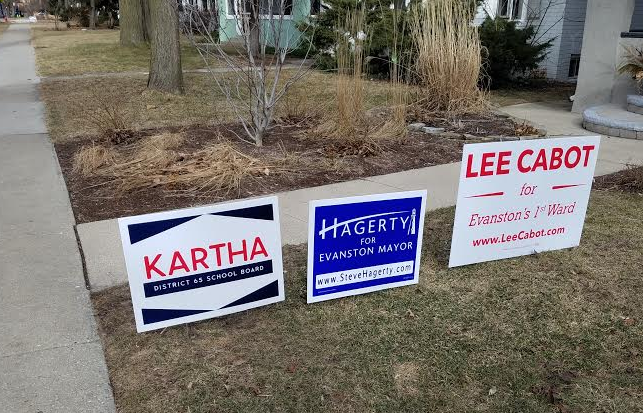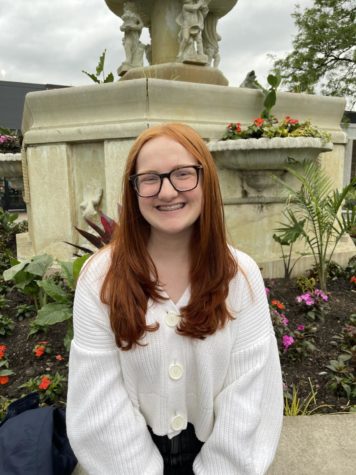Opinion | Local politics has greater impact on our lives than national politics
March 22, 2021
Politics have become a must-see event and the epicenter of many people’s thoughts and conversations. The showman qualities of our former president and elected officials, along with the increase of party polarization, led many everyday people to engage in national politics. Yet, that engagement does not pertain to local or even state politics.
Personally, I am guilty of this. I had no idea who the mayor of Evanston was until my freshman year, when one of my teachers told me. I did not know how our local government worked, and, in all honesty, I still have lingering questions. Despite this, local politics are the most important, more so than national politics.
“If I had to estimate, 10-15 percent of Evanstonians are actively engaged, another 60-70 percent are moderately engaged, and the others are unengaged, would be my general sense. I think the majority are reading the newspaper and are paying some attention, but I really believe that most people really like Evanston,” says Evanston Mayor Steve Hagerty. “They made the intentional decision to live here, raise their families here, work here, all of that they pay moderate attention to in their community. They pay a little more attention during election season; they do their due diligence and elect people that represent their values and will do a good job being in power to make good on behalf of the people of this city over the next four years.”
People care about where they live, but they fail to significantly interact and engage with the politicians that shape their daily lives. Local politicians dictate our everyday living. By not investing our time in the details and development of certain politicians and policies in our community, the place we care so much about may turn into somewhere unrecognizable. Because if we as a community truly care about the city we live in, it is our duty to invest some time in local politics.
We find ourselves turning our attention towards national politics, for many reasons, one being that national politics center on the more exciting issues. They are larger, impacting massive amounts of people, allowing for a nationwide conversation. As national politics have become more polarized, people have become increasingly more engaged to see their party “win.” These conversations can be the connective tissue for some people and groups that seldomly interact but can unite under a common cause or party. The connection that national politics can give people—the beneficial and the harmful—when disagreeing, have shaped our society into one that is hyper-focused on the issues on a national level.
“Naturally, people are more engaged on national issues. I think the reason for that is that there’s a lot of media coverage, 24/7 on those national issues. The reality is that local media has been weakened over the last 30-40 years. There used to be a local newspaper that would be on everyone’s doorstep back in the day. That does not exist anymore,” says Hagerty. “There’s attention deficits because we are pulled in so many different directions. I think the ammunition of the media has real repercussions for residents to know what is going on locally in our government.”
Local politics are unable to connect people across the country, as they obviously are limited to a specific area; oftentimes, people in the same area are relatively like-minded. Furthermore, national politics have a lot more buzz to them. When people watch or read the news, it is almost always national news. Those headlines draw people in, make them care about what happens. The former administration fed into this idea of less buzz-worthy topics, as the Trump administration almost always had one or more racy headlines plastered across our screens. This resulted in many people engaging with national politics on social media; Trump even contributed by having his own tweets become highlights of the news cycle. That conversation on social media and on our TV screens garnered a specific focus towards national politics, leaving local politics mostly in the dust.
Despite this lack of attention, local politics are even more important than national politics. This is because they directly impact our lives. City council impacts the rules and regulations that dictate everything from garbage gets picked up to how much funding is allocated to the police, and so much more. National politics rarely get to have the same direct impact that local politics can. Even the impact that national politics can have doesn’t matter unless the local governments enforce those decisions properly, as they were intended.
This is what makes local politics so important: they have the direct impact that national politics don’t. Arguments have been made that the national government does not really do anything or affect anyone, which is because the enforcement and implementation of those laws are done mainly at the local level. Evanston even has its own local election coming up on April 6, 2021, but not that many people talk or even know about it. There was even a mayoral primary on February 23, 2021, that went largely unnoticed. In that election, Mayor-elect Daniel Biss won enough of the primary vote to avoid the mayoral race even being on the ballot box in April.
As a community, we perpetuate the lack of attention towards local government by solely recognizing the national one. Every time we fail to look at who the mayor or our alderman is, information about city council events or local elections, we perpetuate this. ETHS even does this because on Nov. 3, 2020, the date of the presidential election, there was no school; yet, on April 6, 2021, there is school. This gives off the idea that local politics are not as important because the school is not making the active choice to try and get students to the polls or volunteer, hoping they passively make those choices. We must learn and take charge when it comes to local politics. It is imperative we pay attention to learn more about the people and issues that directly impact our community. That does not mean everyone needs to attend every city council meeting or read every article about local politics. Simply, make more active choices in educating and engaging yourself with local politics in order to help benefit the Evanston community as much as possible.










